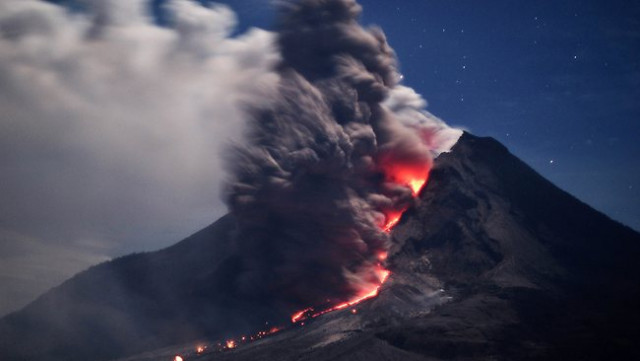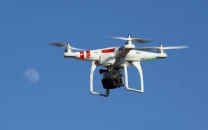Volcano shuts major Indonesian airport during Eid holiday rush
Airport spokesman Liza Anindya said that the concern is that the ash might affect flights

PHOTO: AFP
The shutdown of the international airport serving Surabaya, on the main island of Java, came days after the airport on the nearby holiday island of Bali was closed by ash from the same volcano, stranding thousands of holidaymakers.
Authorities ordered the closure of Juanda Airport near Surabaya between 1:30 pm and 8:30 pm (1330 GMT) due to increased activity from Mount Raung, which has been erupting violently in recent weeks, airport spokesman Liza Anindya told AFP.
"The concern is that the ash might affect flights," she said.
The closure came during peak holiday season in Indonesia, when people in the world's most populous Muslim-majority country flood out of cities and head to their home towns and villages to spend Eid with their families.
Read: Holidaymakers stranded as Indonesian volcano closes airports
The celebration, which comes at the end of the fasting month of Ramadan, is expected to fall on Friday in Indonesia.
Authorities raised the alert status of Mount Raung, about 110 miles (180 kilometres) west of Surabaya, to the second-highest level at the end of last month as the volcano began emitting clouds of hot ash and lava.
The airport on Bali, a top holiday destination that attracts millions of foreign visitors each year, was closed twice last week during peak season -- with the longest shutdown lasting two days -- due to the ash.
Thousands of tourists were left stranded at the island's Ngurah Rai airport and almost 900 flights were cancelled or delayed, according to airport officials.
Disaster agency spokesman Sutopo Purwo Nugroho said that Mount Raung was hurling thick smoke up to 2,000 metres (6,500 feet) into the air on Thursday. No evacuations of nearby residents were necessary at the moment, he added.
Read: Powerful 7.8 quake shakes Japan
Air traffic is regularly disrupted by volcanic eruptions in Indonesia, which is home to 130 active volcanoes.
The main concern for airlines regarding volcanic ash is not that it can affect visibility but rather that it could damage aircraft, as it turns into molten glass when sucked into engines, according to experts.



















COMMENTS
Comments are moderated and generally will be posted if they are on-topic and not abusive.
For more information, please see our Comments FAQ